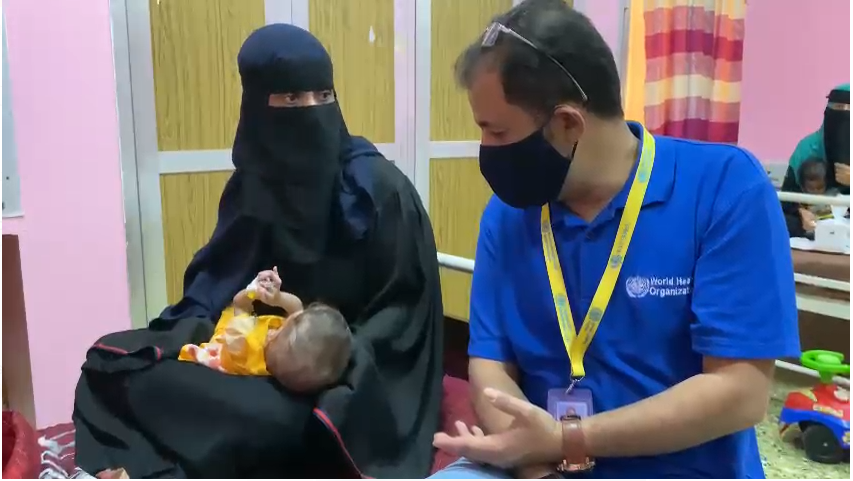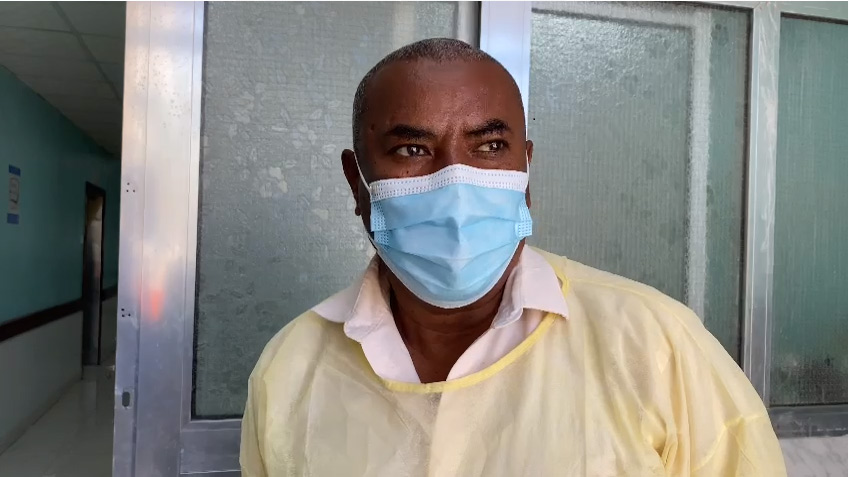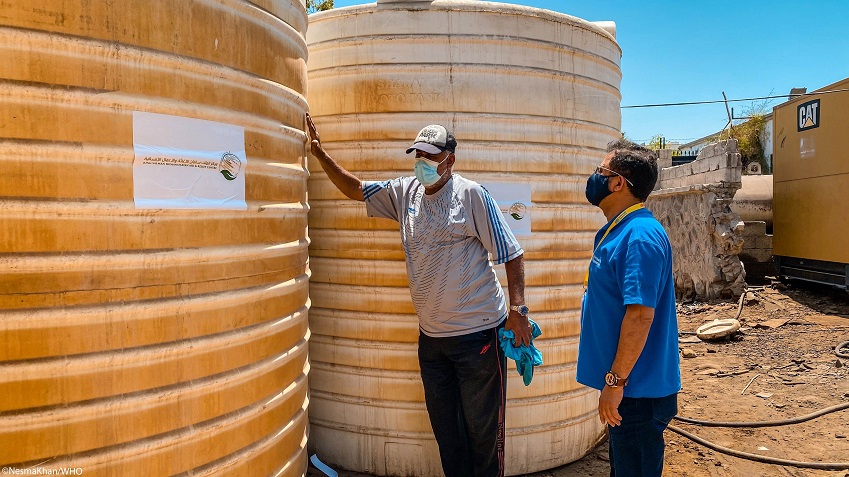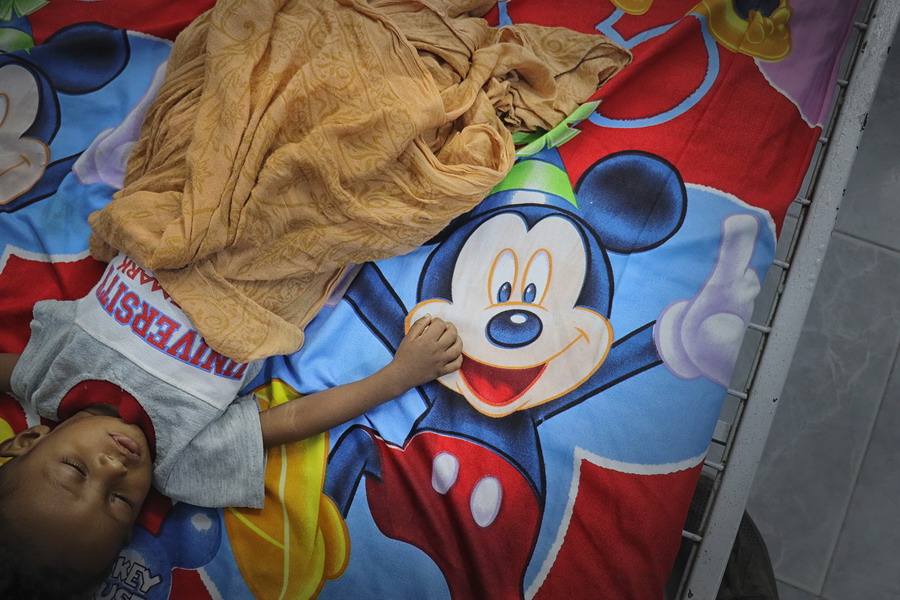Malnourished children of Yemen in the grip of suffering

27 May 2021 – The conflict, economic decline and a poor health environment have been some of the drivers of acute malnutrition in Yemen. The number of children suffering has not decreased. In comparison to 16% in 2020, acute malnutrition and severe acute malnutrition among children under 5 reached 22% in 2021. This has been the highest rate of severe acute malnutrition recorded in Yemen since the escalation of the conflict in 2015.
Rozan is 10 months old from Lahj. Her mother brought her to the therapuetic feeding centre in WHO-supported Ibn Khaldoon hospital suffering from malnutrition and weighing as little as 3.9 kg. A healthy child her age should weigh at least 8 kgs. “She was frail and weak. She has been receiving treatment in this centre for 3 days now. She is feeling better; I can see the progress.” Her mother says happily.
“The support we receive here is very helpful. The treatment and meals are covered for free and we are well taken care of. Thank you for that,” adds Rozan’s mother.
Rozan is one of thousands of children who have been acquainted with suffering too early in life. Many of these children are likely to die if urgent care is not made available for them.
Child malnutrition challenges the physical and mental development of children, especially during the first 2 years of their lives. While Yemen is faced with looming famine, and widespread malnutrition, the future of an entire generation is at risk.
Ashwaq works at Ibn Khaldoon feeding centre. She attends to malnourished children every day. “Children suffering from malnutrition are continuously coming into this center to seek treatment. Many families who were forced into displacement and vulnerable families would have nowhere else to go if centres like this one did not have their doors open,” says Ashwaq.
“This centre ensures the provision of treatment, medicines and meals for malnourished children coming from the most vulnerable communities,” she adds.
WHO and KSrelief sustaining essential nutrition services in Yemen
WHO and the King Salman Humanitarian Aid and Relief Centre (KSrelief) have been sustaining the capacity of the therapeutic feeding centres across the country to ensure delivery of essential health services are maintained free of charge for populations affected by the humanitarian crisis. Today, 90 operational centres across Yemen are providing health services for people in need (82% of total centres in the country).
The support WHO and KSrelief deliver includes rehabilitation of targeted centres, equipping them with essential medical, laboratory and water, sanitation and hygiene supplies. In addition to supporting health personnel with incentive payments and capacity-building. As well as supporting families accompanying their children with admission kits and counselling. From September 2020 to March 2021, 12 873 children under the age of 5 have been treated and 12 873 caregivers benefited from counselling. During this period, 1300 health workers in the designated centres have been supported with on-the-job training to strengthen quality service delivery in the context of COVID-19.
Statement on protection of health care in complex humanitarian emergencies
1 June 2021 – This year marks the ninth anniversary of World Health Assembly resolution 65.20 (2012) in relation to the protection of health care in complex humanitarian emergencies.
With deep regret, we note that violence against health care personnel and attacks on health care continues to be reported, including incidents linked to the response to the COVID-19 pandemic across the world.
During the COVID-19 pandemic, more than ever, protecting the health, welfare and lives of health care workers on the frontline is critical to enabling a better response.
WHO will continue to expand and refine its coordinated efforts to collect data on the incidence and types of attacks on health care, including in the context of the COVID-19 pandemic, in all complex humanitarian emergencies. By so doing we will further advance our understanding of the scope and nature of the problem in different contexts and better inform the design of mechanisms to prevent and respond to the attacks.
WHO also takes this opportunity to underscore that all parties in armed conflicts must avoid militarizing health care facilities and health transportation, including ambulances and other types of mobile medical units. Such acts are totally unacceptable. They undermine the vital humanitarian work being undertaken and irresponsibly increase the risk of exposing patients and health care workers to potential attacks.
COVID-19 posing unprecedented threat on war-torn Yemen
20 May 2021 – While Yemen was bearing the brunt of the world’s largest humanitarian crisis, the COVID-19 pandemic further aggravated the crippled health infrastructure. The people of Yemen have been living through long-running armed conflict; threatened by looming famine, disease outbreaks, forced displacement and a shattered economy.
As of 30 April 2021, the number of reported cases of COVID-19 in Yemen was 6294 people and 1222 confirmed deaths. However, health partners remain concerned that the number of cases continue to be underreported due to an array of reasons and that the official epi-curve underestimates the extent of COVID-19 in Yemen.
The crisis in Yemen has not exempt frontline health care personnel. Given that they have to work under extreme adversity and risk their lives while the health system is unable to pay their wages.
22 Hospital in Aden is supported by WHO and the King Salman Humanitarian Aid and Relief Centre (KSrelief). Ahmed Hassan works as a nurse in the intensive care unit (ICU). He works directly with COVID-19 patients and risks his life daily. “The community is not certain that COVID-19 is a true threat. They may not be aware of the dangers it poses on the lives of people, especially the most vulnerable, including the elderly and those with underlying chronic diseases. The situation we face in hospitals is dire,” says Ahmed.
 Ahmed Hassan works as a nurse in the ICU at 22 Hospital in Aden supported by WHO and KSrelief
Ahmed Hassan works as a nurse in the ICU at 22 Hospital in Aden supported by WHO and KSrelief
WHO and KSrelief easing the burdens of the people in Yemen
WHO and partners have been leading the response to COVID-19 in Yemen to avoid a public health catastrophe. Funding from KSrelief has been a critical contribution to the COVID-19 response. Efforts through the COVID-19 project aim to help prevent further spreading of the disease and to mitigate morbidity and mortality by way of expanding pandemic preparedness, early detection of cases, as well as through mounting appropriate control and public health containment measures.
Based on the Yemen Preparedness and Response Plan, efforts aim to fill critical gaps in 28 dedicated health facilities that manage severe cases of COVID-19 through providing personal protective equipment, medical equipment and consumables. In addition to supporting 10 laboratories with PCR testing capacity, enhanced surveillance through points of entry and rapid response teams.
The COVID-19 response also supports capacity-building of the health staff to ensure that quality services are provided in supported hospitals. WHO carried out case management training for 90 technicians and 500 health care workers in targeted health facilities.
“Thanks to WHO and KSrelief for the unremitting efforts. The critical aid they provide includes 20 000 litres of fuel per month to keep the hospital functional, around 300 oxygen cylinders per month, a daily average of 20 000 litres of safe water, medical supplies, laboratory supplies and equipment, including recently an x-Ray machine. Not to mention COVID-19 supplies,” says Dr Nasser Harharah, Director of 22 May hospital in Aden governorate.
 The continued fuel support to 22 May hospital in Aden is vital for the functionality of the hospital and service availability that benefit those who need them the most
The continued fuel support to 22 May hospital in Aden is vital for the functionality of the hospital and service availability that benefit those who need them the most
The pressure the hospital is forced to undertake is significant, and more needs to be provided. “The ICU is operational 24/7 and further COVID-19 supplies, including PPE, is needed to protect the health team,” Dr Nasser adds.
Anees is a health worker at 22 May hospital. He is one of thousands of health personnel across Yemen working under the burden of the conflict and disease outbreaks. “This hospital is the biggest public hospital in the area, and the only one in a large circumference that provides specialized care. Continued support is critical for the functionality of this hospital,” he says.
KSrelief has been the main funding partner of WHO Yemen since 2016. Through the partnership, and in coordination with local authorities, we have been responding to Yemen’s most urgent needs and sustaining the health system; preventing it from total collapse.
Government of Italy and WHO supporting urgent services for children suffering from malnutrition in Yemen

27 April 2021 – Nearly 2.3 million children under the age of 5 in Yemen are projected to suffer from acute malnutrition in 2021, 400 000 of whom are expected to suffer from severe acute malnutrition and could die if they do not receive urgent treatment.
Three-month-old Naynoor is one of these children. Her mother brought her to a WHO-supported therapeutic feeding centre in Dhamar district; her little body frail and suffering from acute malnutrition. She has been receiving treatment in the centre for 12 days now. “She is feeling much better now. She is taking milk and medication regularly thanks to support from Italy. I am thankful her health has improved,” says Naynoor’s mother.
Vulnerable populations in hard-to-access areas are suffering in silence with little to no access to basic and essential health care services. Malnutrition perpetuates vulnerability and illness within families who already lack the necessary resources. In the midst of prolonged conflict and devastated infrastructure, some families will watch their malnourished children wither if no action is taken.
Little Hifthallah was brought to the same centre accompanied by his mother. Malnourished, he came in suffering from diarrhoea and vomiting. He has been receiving regular care and treatment in the centre for 3 days now. “My child is being cared for and treated at this centre for free,” says his mother.
In one of the least permissive operational environments possible for humanitarian interventions, with COVID-19 exacerbating the difficulites, WHO and Italy continue to fight for the lives of children in Yemen. Through expansion of the availability, access and quality of critical nutrition services for mothers and children provided at the targeted therapeutic feeding centres. Gender and child-friendly admission and discharge kits, water, sanitation and hygiene items, as well as meals to caregivers, are other essential supplies provided to families.
Thanks to the generous support of the Government of Italy through the Italian Agency for Development Cooperation;30 new centres were established and are currently functional, scaling up the total number of centres to 83. This represents 80% of the total number of functional centres in the country. In these centres, WHO has been saving the lives of children under 5 from severe acute malnutrition. Between 2019 and March 2020, 15 000 children were treated in WHO–supported therapeutic feeding centres. Death rates among patients with severe acute malnutrition with medical complications has decreased from 3.6% (since 2017) to 2.1% (as of May 2020).








